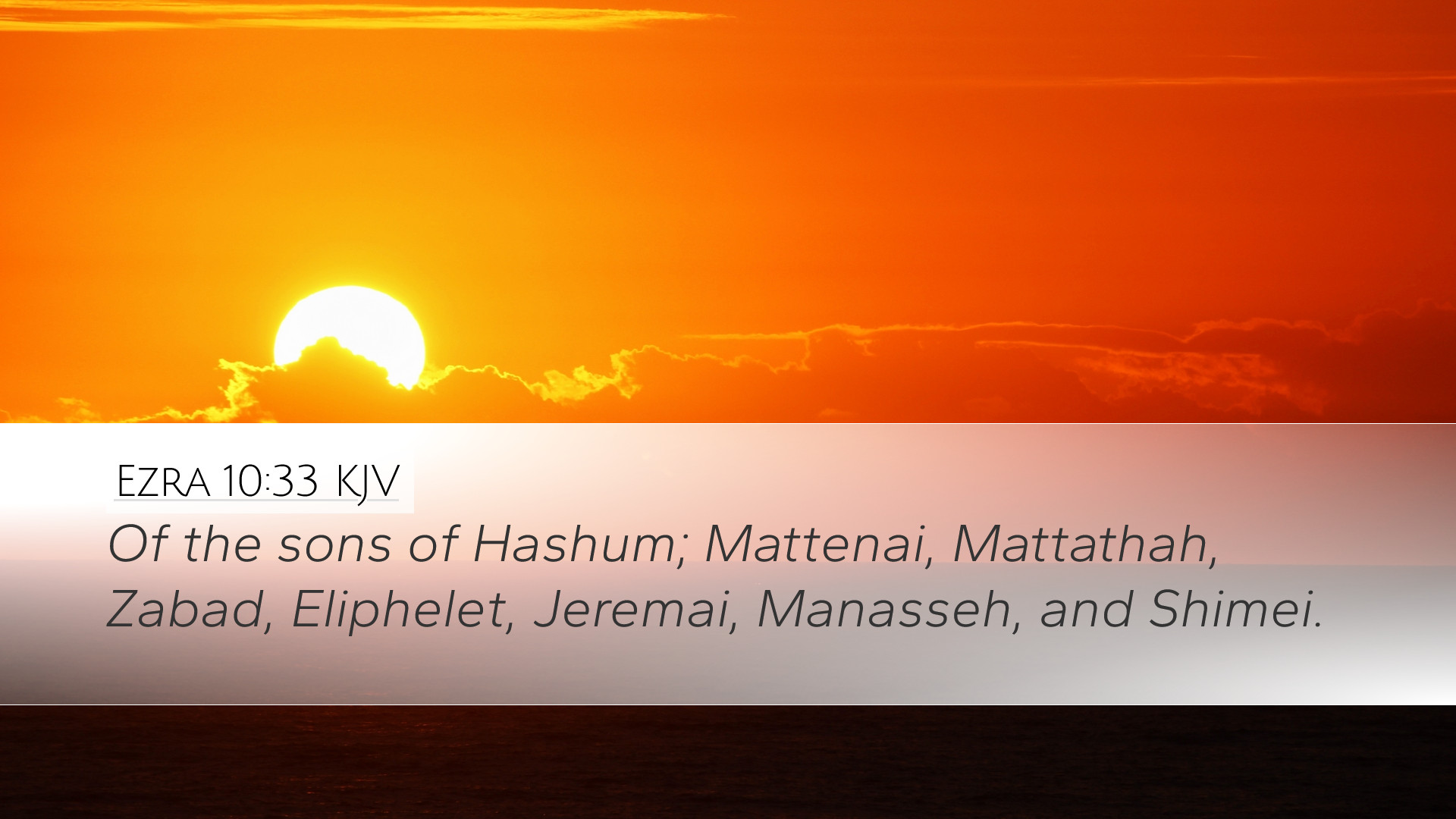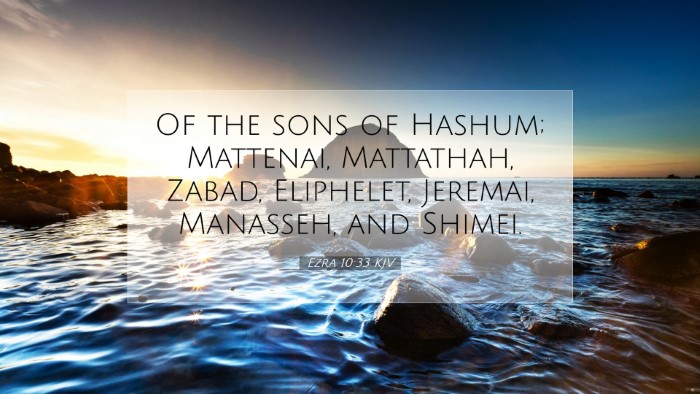Commentary on Ezra 10:33
Ezra 10:33 is a significant verse within the book of Ezra, which deals with the restoration of Israel after the Babylonian exile. In this passage, the attention is drawn to the importance of separation from foreign influences that could lead Israel away from their covenant with God. This commentary aims to provide insights from esteemed public domain commentators, blending their thoughts to give depth to the understanding of this verse.
Text of Ezra 10:33
"And of the priests there were: Jeshua the son of Jozadak, and his brethren; the first to offer burnt offerings." (Ezra 10:33)
Context and Background
The book of Ezra recounts the return of the Jewish exiles to Jerusalem and the rebuilding of the temple. This chapter specifically addresses the sin of mixed marriages among the returned exiles, highlighting the importance of fidelity to God’s laws. Ezra, as both a scribe and a priest, played a crucial role in leading the people back to their religious roots.
Insights from Public Domain Commentaries
Matthew Henry’s Commentary
Matthew Henry emphasizes the significance of purity in worship and the need for the people of Israel to return to the covenant relationship established with God. He notes that the mention of Jeshua and his brethren indicates the restoration of proper worship practices, which had been neglected during their time in exile. Henry points out that the act of offering burnt offerings was a critical return to the atonement sacrifices that symbolized devotion and repentance.
Albert Barnes’ Notes
Albert Barnes elaborates on the leadership role of Jeshua, stating that he embodies the hope of restoration and spiritual renewal. Barnes comments on the first act of worship mentioned in this context—burnt offerings—as a foundational aspect of their covenantal identity. It signifies not just a return to religious rituals, but also a heartfelt dedication to God, marking a new beginning for the exiles.
Adam Clarke’s Commentary
Adam Clarke offers a thorough examination of the significance behind the names mentioned in this verse. He explains that Jeshua, the son of Jozadak, represents a line of priestly succession that is vital for the restoration of worship in the Temple. Clarke also points out that the first offerings made by these priests are symbolic of both gratitude and obedience. He notes that the burnt offerings indicate their desire to reconcile with God, acknowledging their past failings and reaffirming their allegiance to His commandments.
Theological Implications
The mention of Jeshua and the act of offering burnt offerings underscore several theological themes relevant for ministers and scholars today.
- Restoration and Renewal: The act of returning to offerings highlights a broader theme of restoration that runs throughout Scripture. Just as the exiles found their way back to God, contemporary believers are reminded of the continual need for repentance and renewal in their spiritual lives.
- The Role of Leadership: Jeshua’s leadership illustrates the importance of godly leaders in guiding congregations. Effective leadership is pivotal for spiritual renewal and for fostering an environment where worship can be restored and thrive.
- Worship as Obedience: The burnt offerings reflect a core principle of worship as an act of obedience to God’s commands. This serves as a reminder that contemporary worship should also align with Scriptural mandates and be rooted in a heart of repentance.
- Covenantal Faithfulness: The verse underlines the necessity for believers to maintain fidelity to God’s covenant. Mixing with foreign influences can dilute spiritual integrity, and Ezra’s call for separation resonates in modern contexts as a warning against compromise.
Application for Today's Believers
As believers reflect on Ezra 10:33, it provides insights for personal, congregational, and communal applications. The act of offering burnt offerings can be interpreted today as an invitation to renewed commitments in worship and service.
- Personal Commitment: Individual believers are encouraged to examine their own lives for areas where fidelity to God may have been compromised. This involves a sincere process of confession and recommitment to His ways.
- Congregational Integrity: Churches are called to foster a culture of accountability where members support each other in maintaining doctrinal purity and spiritual vitality. This involves teaching that stresses holiness and separation from influences that distract from the Gospel.
- Focus on Worship: Worship leaders and congregations should prioritize heartfelt worship that reflects both gratitude and obedience to God. This includes not only music and liturgy but also lifestyle worship that embodies Christian principles in daily life.
- Engagement with Scripture: Pastors, students, and scholars are encouraged to delve deeper into the texts and understand the historical context, which enriches the understanding of how Scriptural principles apply in various cultural situations.
Conclusion
Ezra 10:33 reminds contemporary believers of the importance of returning to foundational truths of faith and the significance of worship in maintaining covenantal relationships with God. Through the insights gathered from various commentaries, we see that the essence of worship involves both a heart of gratitude and a commitment to obedience. It challenges all who read it to consider their own relationships with God, the leadership within their communities, and the purity of their worship practices.


